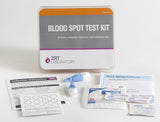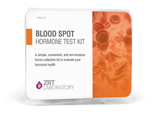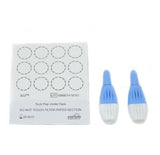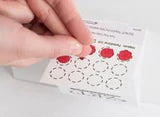Male / Female Blood Spot ICPMS Toxic and Essential Elements is for testing six following Elements in the body, both men and women. This blood spot test kit measures the levels of:
1. Cadmium (Cd),
2. Mercury (Hg),
3. Selenium (Se),
4. Zinc (Zn),
5. Magnesium (Mg),
6. Copper (Cu).
Test Result: You will receive your test result 3-5 working days after the laboratory receives your sample. You will see your hormone levels in graphics and numbers on your test results. You will also see laboratory comments by a Hormone Specialist PhD Dr in the comments: you will find a doctor's analysis of your hormone levels and what to do next.
- Collect samples from the comfort of your home and post them to our lab.
- The test must be used within 12 months after the purchase date.
- The test kit includes a laboratory fee: no additional laboratory cost or tax.
- Customers are responsible for shipping their samples to the laboratory.
- Click the link to see the Sample Test Result Report
Toxic elements can significantly increase our risk of developing conditions like dementia, infertility, diabetes and cancer. They are also known to cause damage to the liver, kidneys and brain, as well as the cardiovascular, nervous and endocrine systems.
If you are experiencing any of the following symptoms, this test kit is for you.
Symptoms of high or low elements in the blood can cause:
- Slow movements and thoughts
- Being sensitive to cold
- Weight gain
- Muscle aches
- Muscle cramps
- Brittle hair and nails
- Dry and scaly skin
- Constipation
- Depression
- Loss of libido (sex drive)
- Pain/numbness and a tingling sensation in hand and fingers
- Irregular periods
- Heavy periods
- Mood swings
- Nervousness
- Anxiety
- Irritability
- Feeling tired all the time
- Sensitivity to heat
- Muscle weakness
- Diarrhoea
- Needing to pee often
- Persistent thirst
- Difficulty sleeping
- Hyperactivity
- Itchiness
- Loss of interest in sex
- Twitching or trembling
- Irregular heart rate
- Unusual fast heat, rare
- Red palms of hands
- Warm skin and excessive sweating
- Loose nails
- A raised itchy rash
If you experience the above symptoms, you might consider using our Toxic & Essential Elements Test and find out if there is anything wrong with your hormones and what to do next.
Selenium
Whole blood and serum indicate current body selenium status, but whole blood is believed to reflect long-term intake better than serum. This is because the selenium concentration in serum is about 80% of what you find in whole blood.
Cadmium
Whole blood cadmium levels reflect recent exposure within the last 50 days. Only about 0.01-0.02% of the total body cadmium burden is excreted daily because it accumulates primarily in the kidneys. The serum is a poor exposure indicator because cadmium in the bloodstream binds to red blood cells, with erythrocyte concentrations 20 times higher than serum.
Mercury
Whole blood is the best indicator of organic (methyl or ethyl) mercury exposure, with 70-95% bound to haemoglobin in red blood cells and a half-life of around 50 days.
Zinc and Copper
Whole blood or serum can be used to assess zinc and copper. Zinc and copper are functional antagonists; therefore, the zinc/copper ratio should be determined, especially in cases where values of both border high and low normal ranges. Whole blood copper levels correlate better to symptoms of copper toxicity than serum, while whole blood zinc levels may better reflect intracellular and long-term zinc status than serum.
Magnesium
No simple laboratory test indicates total body Mg status in humans. Less than 1% of body magnesium is found in blood, with approximately 0.3% in serum. Serum magnesium is commonly tested, but there is little correlation to total body magnesium or concentrations in specific tissues. Serum magnesium levels are kept under tight homeostatic control. They are usually normal even when there is a nutritional magnesium deficiency because serum levels are raised at the expense of intracellular stores. Whole blood magnesium contains a high concentration of magnesium ions, which is essential for many metabolic processes and better reflects long-term body status.
How to use












